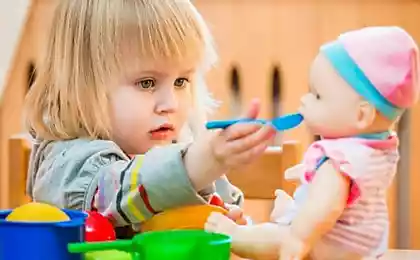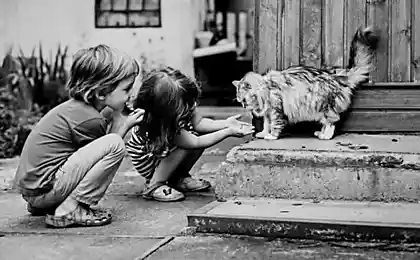161
What things can be entrusted to the child
All parents dream that their child grew up hardworking, that he was an assistant in all household chores. Children grow up, become more independent, but mother’s free time for some reason is not added.
513803
DepositPhotos
At what age to teach a child to domestic work and what work will be feasible for children of different age groups?
Until recently, such a question did not arise. Without exception, children in peasant families nursed younger brothers and sisters, carried water, swept, cooked simple food, fed animals.

DepositPhotos
Modern parents are afraid to take away their children’s carefree childhood and raise princes and princesses, in every possible way protected from any housework. They are not sure that children can help them or that they should.

DepositPhotos
So, can you really leave the kids alone, let them rest until the wedding? Psychologists have identified several main reasons why Children should help parents at home.
The insecurity of parents often stems from the fact that they do not know at what age the task will be possible for the child. "Site" I have prepared an approximate, but not at all mandatory list, which will tell you what kind of work your little assistant can do.

2 years old

3 years old

4 years old
557880
5 years old

6 years old
7 years old

8-9 years old.

10 to 11 years old
11-12 years old
13-17 years old
And your child does. housework?
Liberal education as a method has failed. It seems that children today lack harsh measures. Parents, come to your senses!
How to become a favorite of your grandchildren and not spoil the relationship with children? First, remember these 10 stop phrases that a good grandmother will never say.
513803
DepositPhotos
At what age to teach a child to domestic work and what work will be feasible for children of different age groups?
Until recently, such a question did not arise. Without exception, children in peasant families nursed younger brothers and sisters, carried water, swept, cooked simple food, fed animals.

DepositPhotos
Modern parents are afraid to take away their children’s carefree childhood and raise princes and princesses, in every possible way protected from any housework. They are not sure that children can help them or that they should.

DepositPhotos
So, can you really leave the kids alone, let them rest until the wedding? Psychologists have identified several main reasons why Children should help parents at home.
- A sense of belonging to the family
Doing household chores, the child feels like a full member of the family, able to make his own contribution to family well-being. - Caring for the future
Children who have no domestic responsibilities at all are unable to take care of themselves and remain children even when all their peers are older. - Organization
Daily household duties in the family helps the child to become more organized and transfer this quality to other areas of life: study, relationships with teachers, parents, peers. - Self-confidence.
A child who knows how to serve himself grows up more successful, independent, self-confident and self-confident.
The insecurity of parents often stems from the fact that they do not know at what age the task will be possible for the child. "Site" I have prepared an approximate, but not at all mandatory list, which will tell you what kind of work your little assistant can do.

2 years old
- Sweep the floor.
- Clean the dust.
- Help with the dressing process.
- Put your clothes on a chair.
- Bring shoes to yourself or other family members, finding a pair.
- Help hang laundry by serving small things.
- Put the disassembled laundry in the washing machine.
- Put the toys back in place.

3 years old
- To put toys, books, to choose your clothes from the common stack of things.
- Dress yourself.
- To fasten and unbutton the buttons on the clothes.
- To help set the table - put napkins, appliances.
- Put the dishes behind you in the sink, wipe the crumbs from the table.
- Show in familiar places where to go to the side of the house.
- Divide sweets or fruits equally.
- Play alone in the street (under supervision, but without the participation of an adult).

4 years old
- Help with the dishes.
- Spread and make up your bed.
- Help cut the salad.
- Make a simple dessert with an adult.
- Choose with an adult products in the store, folding them in a cart.
- Make yourself a simple breakfast: get cereal and milk, make a sandwich.
- Hang small things in the dryer.
- Playing at home without constant supervision.
557880
5 years old
- Help me thread the needle.
- Wrap a string on a coil.
- Pour yourself and everyone cold drinks.
- Pay for small purchases.
- Disassemble laundry for washing on white and color.
- Sort in the kitchen cabinet cutlery, restore order there.
- Carefully hang things on the chair after undressing.
- Hang your outer clothes in the closet.
- Put your clean clothes in the closet.
- Feeding a pet.
- Clean up after the pet at the direction of an adult.
- Pick berries.

6 years old
- Put the coins together, disassembling them for the same value.
- Disassemble laundry into categories.
- Count the number of guests and help set the table according to the number of people, check that everyone has enough.
- Vacuum the room and carpets.
- Water the flowers.
- Help take out the trash.
- Use the rake in the garden.
- Independently cook simple food: hot sandwich, boiled eggs.
- Pack your things in kindergarten, school, a circle on the written list.
7 years old
- Look at the clock with the hands and report.
- Help everyone tie their shoelaces on a bow.
- Wear clothes according to the weather.
- Put it in your own briefcase.
- Wash and peel vegetables.
- Leave the toilet and bathroom in order.
- Bathing a pet.
- Walking with a small pet.
- Use the phone.
- Change the batteries.
- Upload apps to your phone.

8-9 years old.
- Go to bed, wake up in the morning by the clock.
- Shopping.
- Discuss purchased products.
- To iron small things.
- Clean your closet.
- To carry out various tasks of parents.
- To help feed younger children.
- Sewing buttons.
- Set up a small sprouted seam on clothes.
- Fill yourself and others with a bath.
- Picking fruit from trees.
- Make a fire and cook food at the stake with the participation of adults.
- Learn new culinary recipes by books and using search engines.
- Be able to paint a brush with a simple thing (door, table).

10 to 11 years old
- Don’t be afraid to stay home alone for a long time.
- Change your bed linen yourself.
- Put the laundry in the washing machine.
- Know the rules of the road, cross the street yourself.
- Visiting the library.
- Make purchases on the list in the store.
- Be able to prepare simple food for the family (clean and cook potatoes, chicken brisket, omelet).
- Be able to give first aid.
11-12 years old
- Drive the bus yourself.
- Helping parents with important household chores (such as making repairs)
- Manage a small amount of money.
- Be responsible for your hobbies.
- Wash the stove and oven.
- Independently allocate time for classes.
13-17 years old
- Cooking for the family.
- Be able to help others in a difficult situation.
- Lie down and get up at a certain time without reminding your parents.
- Have a real idea of your capabilities.
- Consistently implement the decisions taken.
- Understand the consequences of your actions.
And your child does. housework?
Liberal education as a method has failed. It seems that children today lack harsh measures. Parents, come to your senses!
How to become a favorite of your grandchildren and not spoil the relationship with children? First, remember these 10 stop phrases that a good grandmother will never say.
























